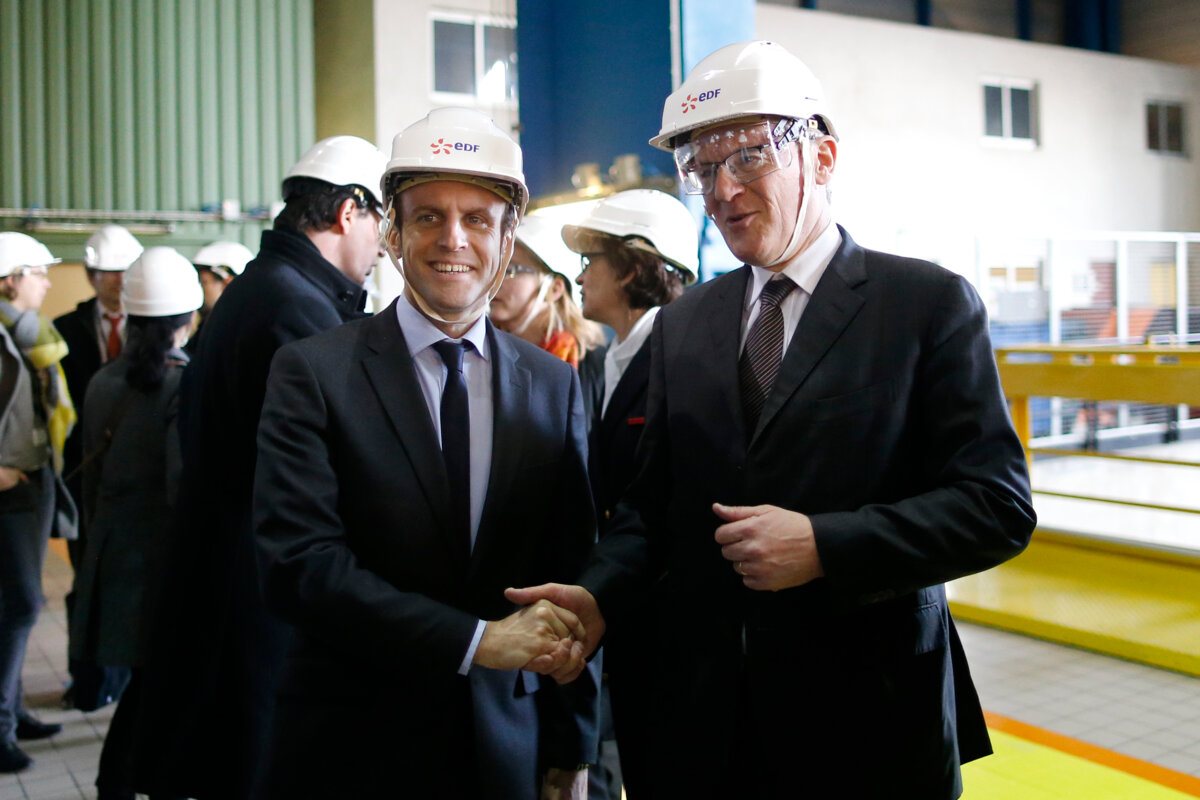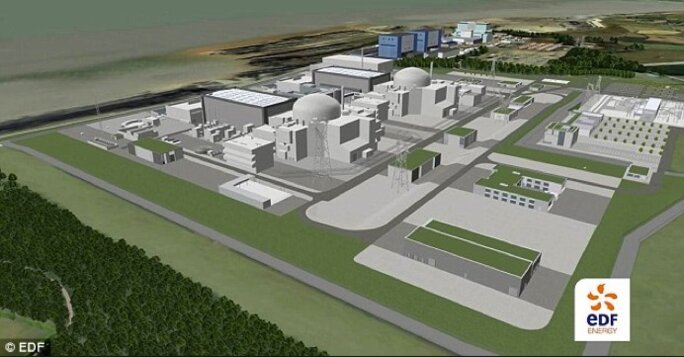France's minister of the economy Emmanuel Macron has stood shoulder-to-shoulder with EDF president Jean-Bernard Lévy over the French energy giant's plans to build two European Pressurised Reactors (EPRs) in Britain. But opposition to the project at the Hinkley Point nuclear power plant in south-west England continues to attract more and more opposition.
First sections of the management and unions opposed it, then the company's finance director resigned over the plans, swiftly followed by doubts raised by France's financial watchdog about the scheme. Now, Mediapart can reveal, a group of EDF engineers who are responsible for the EPR and for the planned modernization of France's own nuclear power stations have also called for the Hinkley Point project to be delayed.
“Why is the funding [of Hinkley Point] not secured? Because the project is both too expensive and too risky. Good projects never have a funding problem.” they write in a uncompromising and lengthy anonymous document sent last week to members of the EDF board and other interested parties. The intervention of this group is a significant development, for never before in EDF's history has a group of in-house engineers expressed themselves publicly against an industrial project in this way. In the past they have tended to support the biggest developments wholeheartedly, regardless sometimes of the figures and any other considerations. It is thus unprecedented to see them shake off their habitual reserve and oppose Hinkley Point, and their powerful criticism will be seen as a warning for both EDF senior management and the French government.

Enlargement : Illustration 1

EDF has itself tried to fight back against opposition to the project which it says consists of “unfounded rumours and fanciful information”. In a written statement on March 30th it said it was facing an “anonymous press campaign … seriously damaging its interests and those of its subsidiary industries and jobs in France and in Europe”.
In their report (see below), the EDF engineers do not go as far as raising question marks over the company's nuclear business as a whole. But unlike Emmanuel Macron, whom some feel has become the chief conductor of France's nuclear industry and who insists that it is vital to commit as quickly as possible to the British project or risk losing all the investments and gains of the last 50 years, the engineers take the opposite view. They say the Hinkley Point project must be delayed as a matter of urgency to ensure the very future of the company's nuclear sector. “To commit today to the Hinkley Point project would amount to France de facto closing down the option of starting the renewal of its nuclear plants at the turn of the decade, the strategic advantages of which one can well determine,” they write.
The delays on the existing EDF nuclear construction projects in Finland and in Flamanville in northern France highlight the problems in building the European Pressurised Reactors (EPRs). Yet to go by the engineers' comments, these problems are as nothing compared with what EDF would face if it went ahead with the British project. “The model that is planned to be built at Hinkley Point (which we call UK EPR) has over time become one of extreme complexity,” they say. According to the engineers there are two reasons for this.
First of all, the work at Flamanville has revealed numerous conceptual errors which have had to be remedied. The engineers claim they are steering blind on the project all the time the French EPR itself is not in production. The second reason is that the British nuclear safety authority, the UK Office for Nuclear Regulation, has called for numerous modifications, including some linked to the control and command system, the power station's “nervous system”, they say. “So, to put it mildly, the UK EPR model will be a new hybrid and complex production model, consequently bringing with it a high level of risk,” they conclude.
Could Hinkley become another Flamanville?

Enlargement : Illustration 3

For the engineers, the risks in going ahead with the project are made greater by the fact that the French nuclear sector has lost a great deal of expertise and know-how. “It is now obvious that the expertise of Areva [editor's note, the French state-owned nuclear firm] with regards forging and producing large components has fallen to a very low point,” says the report, making reference to the problems with the reactor vessel at the construction project at Flamanville. Moreover, the engineering teams from EDF and Areva, which are about to merge, are not able to carry out the research and implementation of the necessary works. It will take at least two to three years, the engineers say, to organise the merger and to learn to work together. This length of time is even more necessary, they say, given that the EPR model has to be completely rethought, in order to be simplified and to keep down the costs, if the nuclear sector wants to have a future.
“What is there to say that Hinkley Point won't be a Flamanville mark 2?” the engineers ask, a reference to the spiralling costs and delays at the French construction site. Flamanville was supposed to cost 4 billions euros and be built in four-and-a-half years. The cost is now put at 10.5 billion and the construction time has been extended to 11 years. “Or 2.5 times the budget and construction time,” the engineers note in their document. The cost of building the two reactors at Hinkley Point has been put at 24 billion euros, which the engineers consider is closer to reality.
But it is over construction delays that the engineers are most concerned. The first EPR at Hinkley is supposed to be built in 78 months or six-and-a-half years, and the second in 72 months or six years. “This entails improving by two years the schedule carried out in China, even though it benefits from working conditions, an experience of nuclear construction and an ability to call on a workforce that are worlds away from what we know in Europe and particularly in England,” says the document. In other words the EDF engineers appear to think that meeting these deadlines is impossible.
The issue of delays has greater significance for EDF than might at first appear to be the case. On March 27 the Journal du Dimanche newspaper revealed the content of confidential agreements made between EDF and its Chinese partner in the Hinkley project, CGN. Although officially EDF is shouldering responsibility for only two thirds of the project, in fact it is going to take on 80% of the risks. Under the terms of the agreement if there are delays on the British construction site – which given the fixed timetable is not entirely unlikely – EDF would have to pay several hundreds of millions of euros to its Chinese partner. The financial risks are therefore considerably higher than EDF or the minister of the economy, Emmanuel Macron, want to admit.
Yet though all kinds of arguments are stacking up in favour of postponing the Hinkley Point project, EDF president Jean-Bernard Lévy is holding firm. Senior management have restated that the date for the first Hinkley reactor to come into service is still the end of 2025 and that no delay is being envisaged. The economy minister Emmanuel Macron, meanwhile, has committed himself to financing the project and to boosting the company's capital, without spelling out either the timetable or the amount involved.
In Britain itself, meanwhile, there is an increased awareness of the discussions which have divided EDF on the issue in France. Since the resignation of EDF's group finance director Thomas Piquemal there has even been a growing clamour in some quarters for an end to what some see as this “farce” and to get the project scrapped. There is also unease in Britain about who exactly is calling the shots over the project. When EDF Energy chief executive Vincent de Rivaz was questioned by British MPs on March 23rd, the MPs showed some irritation as the French executive ducked questions about exactly when the project would get the final go ahead, instead referring the issue back to the French economy ministry and its boss Emmanuel Macron. A frustrated Conservative MP James Heappey said: “It is clear that ... the final decision on the project is entirely in the hands of President Hollande and the French Government.” Meanwhile the opposition Labour Party's energy spokesperson Lisa Nandy said: “Britain's energy security now appears to be in the hands of the French and Chinese governments.”
-----------------------------------------------------------------------------
- The French version of this article can be found here.
English version by Michael Streeter


